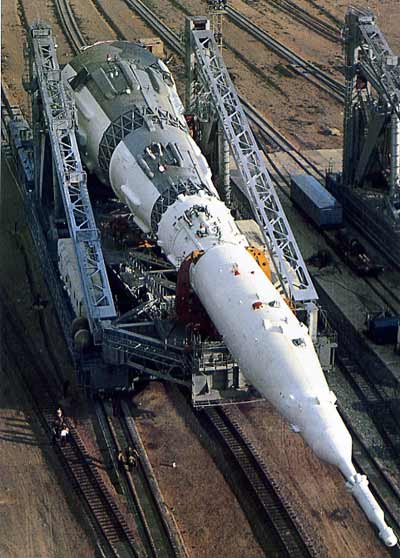Why did so many of us believe that there was no Moon race?by Taylor Dinerman
|
| Nearly forty years later, the question arises: why were so many respectable journalists and experts so ready to believe the Kremlin’s line? |
The Soviet Moon program was well underway and Korolev’s successor, Vassily Mishkin, still had access to the resources needed to build the gigantic Moon rocket, the N-1, that they planned to use to get to the Moon. Beginning in February 1969, they made four attempts to successfully launch it, and failed every time. US spy satellites took pictures of the N-1 on its pad, and detected all four catastrophes.
Also at the time there were numerous public Russian statements about their effort to beat the US to the Moon or at least to match the Apollo achievement. Alexei Leonov is quoted in Asif Siddiqi’s definitive study Challenge to Apollo as saying in April 1966, “I think that I do not disclose any secret by saying [that] Soviet cosmonauts are preparing for such a journey [to the Moon] I should very much like it if a Soviet man went to the Moon first because we were the first who made the most important steps in space.”
Yet a few days after Armstrong, Aldrin, and Collins made their historic flight, Russia—which, at the time, could not deny its reality—began to deny that there had been a race. “Academician Sedov, the man who had made the infamous announcement on the launch of a Soviet satellite during the International Geophysical Year in 1955, told reporters in Peru in late October 1969 that the Soviet Union had never announced it would send men to the Moon.” Siddiqi adds “Fortunately for Sedov no one bothered to read to him his pronouncements from earlier in the decade.”
That same month, Leonid Brezhnev tried indirectly to make the same point by stressing that “We are going our own way; we are moving consistently and purposefully… Our way to the conquest of space is the way of solving vital fundamental tasks, basic problems of science and technology.”
In America and elsewhere there were plenty of experts who read the signals coming from Moscow and interpreted them in exactly the way the Soviets had hoped they would. In a front-page of the New York Times, science writer John Noble Wilford wrote that “according to some observers in Washington and some American scientists, the Russians may never have had a high-priority goal and timetable for a lunar landing.” Within a fairly short time this had become the accepted wisdom, without the careful qualifications that Wilford used. Jim Oberg, in his seminal 1981 Red Star in Orbit, quoted Walter Cronkite, known as “the most trusted man in America”, saying in 1974, “It turned out the Russians were never in the race at all.” This was echoed by both The Times of London and The Guardian, which Oberg quotes “… some Western observers were arguing that the ‘Moon Race’ was a myth … This turned out to be the case.”
Nearly forty years later, the question arises: why were so many respectable journalists and experts so ready to believe the Kremlin’s line? Was it simply politics, or was something else at work? For the Russians it was simply patriotism, and for Western Europeans it was probably a complex stew of emotions including envy and resentment, but why were so many Americans ready to denigrate their own country’s achievement?
Oberg’s reasoning still makes sense: “The left gained support for the oft-expressed complaints about the wastefulness of Apollo expenditures. The right found confirmation of beliefs that the Soviets were too backward to ever dream of competing head-on with American know how. The scientific community found ammunition for its general condemnation of wasteful astronaut jaunts rather than allegedly more productive unmanned exploration. The net result was the political neutralization of the implications of the Apollo program.”
The American space program’s real difficulties began in the spring of 1968, when NASA’s budget for everything except Apollo was drastically slashed by the House appropriations committee. In the early years of the Nixon administration the program suffered from an inability to define a clear set of goals. The Space Shuttle emerged as the only thing the agency seemed able to salvage from its Apollo success.
| After the ISS is finished there will not be the same political motivations to denigrate it, but that does not mean that the story of how and why it was built will not be distorted for different political reasons. |
At the time, Vietnam and Watergate merely added to the already sour national mood. The idea that the Moon Race had been some sort of hoax simply played into the dominant zeitgeist. However, even in an age of cynicism and turmoil, the seeds were sown for the new information economy, a revolution in which Apollo had played an important part.
Sometime within the next couple of years NASA and its international partners will complete the International Space Station. This is not as historic as the Moon landing, but it been a hard and expensive process. It has also been the subject of even more sustained controversy than Apollo. After it is finished there will not be the same political motivations to denigrate it, but that does not mean that the story of how and why it was built will not be distorted for different political reasons: just a warning.
